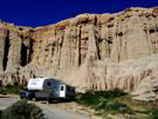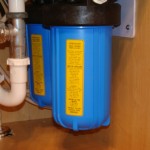By Bob Difley
 Until you become a dedicated boondocker and install a sustainable energy source, like solar panels, a wind generator, or a fusion nuclear generator, follow the tips below to reduce your electrical usage–and the amount of time you need to run your noisy generator to recharge your batteries.
Until you become a dedicated boondocker and install a sustainable energy source, like solar panels, a wind generator, or a fusion nuclear generator, follow the tips below to reduce your electrical usage–and the amount of time you need to run your noisy generator to recharge your batteries.
- Turn off all appliances, lights, radio, TV, and anything else that requires electricity when not in use.
- Don’t leave your porch light on (a particular annoyance to me when I am not so fortunate to be able to camp away from neighbors, and he/she leaves the light on, ruining my night vision for seeing night critters and star gazing).
- Coordinate your generator running time with the use of power-hungry appliances. For instance, schedule your showers, water heater, use of microwave, coffee grinder, and dishwashing all within a short period of time when you can run your generator to power them, rather than pull juice out of your batteries. This also charges you batteries at the same time.
- Time your day to match the sun, rising when it does and going to bed with it also. This cuts your light usage down considerably.
- If you read in bed, try using small rechargeable battery powered reading lights. You can recharge the batteries when you hook up next time and you won’t run down your house batteries with your RV’s lights. And you will probably disturb your mate less.
- Monitor your house batteries charge with a voltage meter so you don’t run them down too low, which can damage the batteries. Deep cycle batteries are considered fully charged at about 12.6 volts and completely discharged at 10.6 volts. Recharge before they get below 60%, or about 12.0 volts.
In addition to these ways to cut your electric usage, there will be times when you are in an LTVA or other boondocking or dry-camping situation (like a rally or week-end event) where you have close neighbors. Remember that there are all kinds of RVers, some—maybe yourself included—who do not mind the noise of a generator running and don’t even consider that the noise or exhaust fumes may annoy others.
I remedy this, as I’m sure others do, by taking a walk during the time my neighbor will be running his generator. But it would annoy me if I had just settled down in my camp chair with a glass of the bubbly when my neighbor fires up his generator. Be courteous to your neighbor and he will return the courtesy.
- Explain to your neighbor that you have to run your generator, and for however long you expect to, and ask when would be a good time when it wouldn’t bother him/her. Maybe you can all coordinate times.
- Avoid running your generator past a reasonable hour in the evening when others may be relaxing, sitting outside enjoying the stars and the quiet, or trying to sleep. The same rule holds for the morning before the late risers greet the day.
Learn more about boondocking with my new eBook, BOONDOCKING: Finding the Perfect Campsite on America’s Public Lands.



Pingback: ניסור בטון
Jerry
Well written and thank you for sharing.
Doc Guerrero
We use battery operated LED puck lights and, since they use very little battery power, I’m going to change to rechargeable batteries when the present batteries are used up (which may be awhile!).
Joespeh
Ditto on spending some more time looking into LED’s?
It’s one of those areas where the technology is changing fast, and prices are coming down quickly. I think we’re finally to the place where it might make cost sense for RVers who watch their power consumption.
Bob Difley
Yep, you’re all right. A typo and the fact that I only learned the difference between ones and twos late in life and still confuse them. I had previously corrected the numbers in my eBook but had picked up the original text for this blog (red face, look of embarrassment, sweaty palms, etc.). I made the corrections in the post. It is not an exact science so I won’t quibble about 12.6 or 12.73 or 12.8. Bottom line–charge your batteries before they read 12.0 volts, or better yet, as Lug_Nut says, about 12.3 volts.
Geoffrey Pruett
And use the new generation of low draw LED bulbs anywhere possible. Just ask for LED on a search engine once you know which bulbs will be needed, keep some of the old ones for backups. Our 79 class C was fully converted to flourescent due too persons who do not understand “off”. We could go 3 days in the winter on a charge (furnace fan) My choice was to go LED for all the marker lights on our current class A, not a battery life issue, a poor choice of headlight switches. Headlight switch now runs cool to touch at all times.
Alpenliter
I’ve read this before, I think in Bob’s e-book that I ordered, and I think it was just a typographical error on the voltage.
Tige Herndon
Bob,
I refer to this site: http://rvbasics.com/techtips/RV-battery-power-management.html for battery status. I use AGM batteries, have solar panels, and all 12v lights have been replaced with LEDs. Also, I keep a digital voltmeter (good to two decimal points) connected to the battery (see Amazon http://www.amazon.com/exec/obidos/tg/detail/-/B000EVWDU0/ref=ord_cart_shr?_encoding=UTF8&m=ATVPDKIKX0DER&v=glance). I don’t own a generator but would consider wind power when the right equipment becomes available.
Tige
Lug_Nut
Hi Bob, I’ve gotta agree with the posts regarding your voltage levels. These are way off, so far they should not even be considered. At a rested state, batteries require recharging at about 12.3 VDC. In a loaded state a lower number could be calculated based on the average load. If your batteries ever read 10.5 VDC, loaded or not, they will be toast in no time. Your other points are very good and certainly excellent advice.
DAN
your voltage numbers are WAY OFF.
in general, a fully charged battery is 12.6- 12.8 volts.
50% discharged is about 12-12.2 volts.
fully discharged is about 10.5-10.6 volts. you do not want to do that to batteries.
depending on the thickness of the plates, (price of the battery) deep cycle batteries have only a limited number of deep cycles in them. heavier, more expensive batteries have more deep cycles available during their lifetime.
deep cycling is defined as a discharge of more than 50%.
check:
/www.windsun.com/Batteries/Battery_FAQ.htm#What%20is%20a%20Battery
DAN L
LARRY WELSH
Don’t forget to turn off the TV signal amplifier. In storage for a month, this ran my batteries down quite a bit, but should not be a problem overnight.
Rick Long
According to Trojan Battery Company, 100% charged is 12.73, and 11.6 would only be 20% charged.